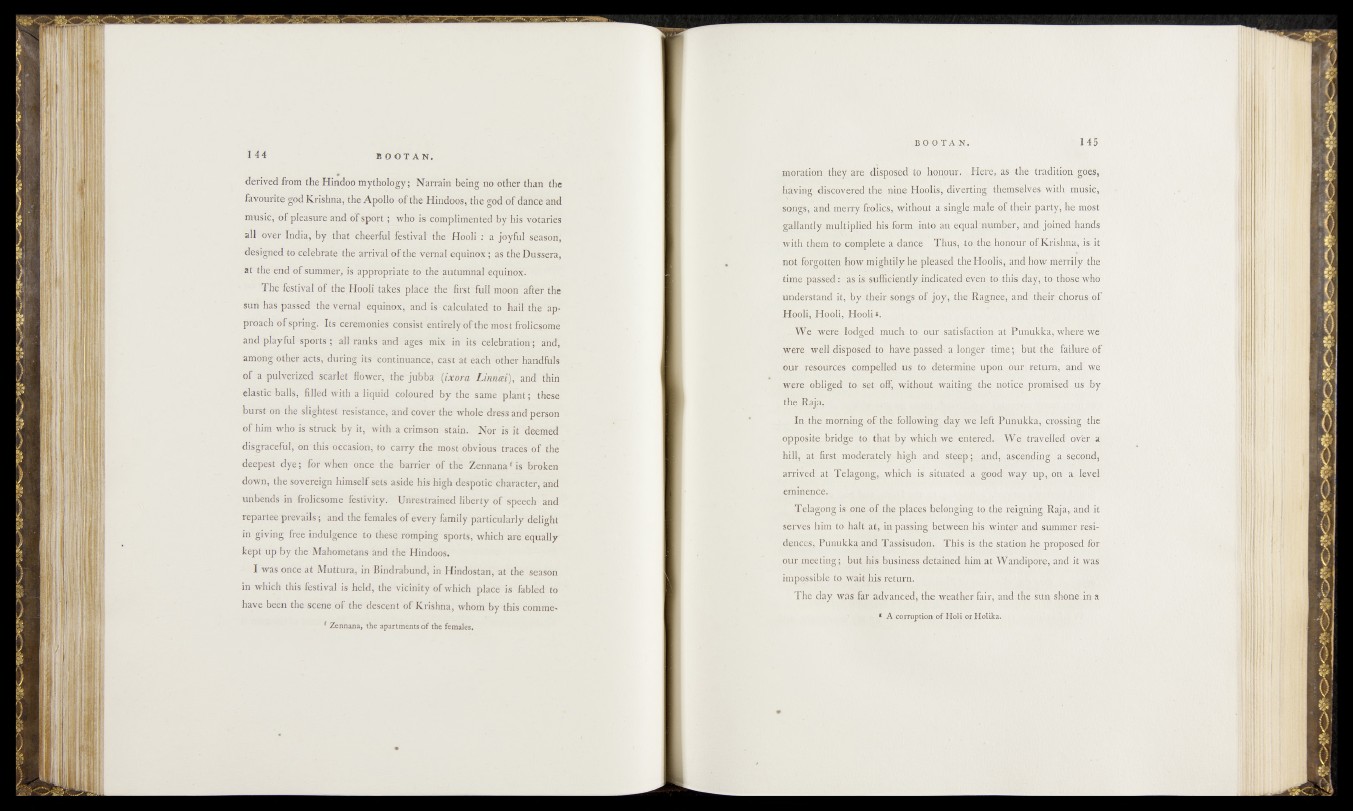
derived from the Hindoo mythology; Narrain being no other than the
favourite god Krishna, the Apollo of the Hindoos, the god.óf dance and
music, of pleasure and of sport ; who is complimented .by his votaries
all' over India, by that cheerful festival the Hooli: a joyful season;
designed to celebrate the arrival of the vernal equinox^ as the Dussera,
at the end of .summer, is appropriate to the autumnal ëquinoxT
- The festival of the Hooli takes place the first'full moon after the
sun has passed the vernal equinox, and is calculated to hail the approach
of spring. Its ceremonies consist entirely of the most frolicsome
and playful sports ; all ranks'and ages mix in its-celebration; and,
among Other Sets, during its-continuance, cast at each other handfuls
©f a pulverized scarlet flower, the jubba (ixora Linnoei), and thin
elastic balls, filled with a liquid coloured by the same plant; these
burst on the slightest resistance, and cover the whole dress and person
of him who is struck by it, with a crimson stain. Nor is it deemed
disgraceful, on" this occasion, to carry the most obvious traces of the
deepest dye ; for when once the barrier of the Zennanaf is broken
down, the sovereign himself sets aside his high despotic character, and
unbends in frolicsome festivity. Unrestrained liberty of speech and
repartee prevails ; and the females of every family particularly delight
in giving free indulgence to these romping sports, which are equally
kept up by the Mahometans and the Hindoos.
I was once at Muttura, in Bindrabund, in Hindostah, at the season
in which this festival is held, the vicinity of which place is fabled to
have been the scene of the descent of Krishna, whom by this commef
Zennana, the apartments of the females.
moratiqp^j{jf^‘ $s>pp§ed ^Hpre^assafe traditi^ ge^,,
having-discoveted the, nmer^LüpU'», ducking tpmjcbc-,. wnh music,
songs, anxt,n)erxy feqlicS', without a of jiurtv;Jhe most
gaflgqtlyumiltiplied hjsform jntotj^jHual number, and: jmned; harigs
[witK-tóm^tq^cpnjplete a;Ji|mc$,: T h u s . . t c y n e j $ - it
not forgotten how mightily lie pleased the I^oplis, and hoWjmcrnly the
time .passed;';,,as is* sufficiently indicated e\ eja tOwtlp^ dayVto*mqse-Who
understand- it, ^ y their songs.p$,jby, "the Kagn^^’andf tho&.chorus-.^f
jffpolLHoki, Hooli*.
We were lodged much tew our satisfaction at Kuhnklu, ,\\htre$\yl!
^ere \éell. disposed to,ihaye,passed> a' longer time;, but the faUwo-pf
our resources, compelled1 us to determine upon otjj; retu^n^^rndj w.e
were obliged to set off, without waiting the notice rpro^nised(jlis*Jby
the Raja.
In thé morning of the following, day wed eft Punujkka,*ci;o,ssingbthe
opposite.bridge to that by which we entered., W%iti%yeBed\o^.fer^ï!
hill, at Erst moderately high and steep; and, ascending a second,
arrived? at Telagong, which is situated a** gcjod; way up^pn&V level
eminence.
Telagong is .one of the places belonging to the rqitgriyig Raja, and it
series him to halt at, inpassing between,his winter and summer r,e§j-
dences, Punukka and Tassisudon. This is <th& station he opposed for
our meeting ;but his business detained him at Wandipore, and it ,wa,s
impossible to wait his return.
The day was far advanced, the weather Fair, and tlje sjin, shone;in a
. -v f A ;eonv|itiott of'lféli Pr Holika.